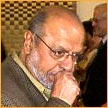
|
'A film is a social art, not a solitary one'
A tete-a-tete with director Shyam Benegal
|
Recently, a brief reception was held at the Emory University, Atlanta, for renowned filmmaker Shyam Benegal. He was in the city for the screening of his film Mammo.
The event was attended by the director of film studies David Cook, the director of Asian studies programme Joyce Flueckiger and distinguished visiting professor and former US Ambassador to Sri Lanka Marion Creekmore, Jr.
Ashok Narayan caught up with Shyam Benegal before the screening of the film:
How does it feel, being honoured away from one's country?
It is always marvellous when people appreciate your work, wherever they are --- in your own country or abroad. It shows you have managed to get across to them with what you have to say in the film. That makes it all worthwhile.
Some of your earlier films like Trikaal, Junoon and Nishant were fiery. Many feel that your foray into relatively commercial subjects such as Zubeidaa has diminished your cinematic excellence. Your comment.
There is a commercial aspect to every film. Making a film for yourself is too expensive a hobby. A film is a social art, not a solitary one.
![Shyam Benegal [fourth from left]](https://www.rediff.com/movies/2002/jun/12shyam2.jpg) You want people to see the film and convey what you have to say. Indian society and the changes taking place in it interest me. I want to catalyse these changes. That has always been my endeavour.
You want people to see the film and convey what you have to say. Indian society and the changes taking place in it interest me. I want to catalyse these changes. That has always been my endeavour.
Also, I hope to keep alive a dialogue with ourselves. While the primary aim of a film is to entertain, they must make people think.
You have used the Beethoven's Fifth Symphony in Mammo...
Modernity and the sense of being part of the old world is becoming a part of the Indian experience. And I have tried to illustrate that through the young boy in the film who goes to school, reads Kahlil Gibran, listens to Beethoven and watches Charlie Chaplin.
My films are influenced by history, contemporary issues and even romance. But all of them fit in this picture somewhere along the way.
What do you think of this recent Hollywoodisation of Hindi films, with slick projects like, say, Ram Gopal Varma's Company?
![Shyam Benegal [left]](https://www.rediff.com/movies/2002/jun/12shyam3.jpg) This is a worldwide phenomenon. Cinema is driven by technology. Of course, if you rely entirely on technology, you might lose out on values that concern you. And you will end up creating spectacles or sensations that people are willing to look at only because of its magical quality.
This is a worldwide phenomenon. Cinema is driven by technology. Of course, if you rely entirely on technology, you might lose out on values that concern you. And you will end up creating spectacles or sensations that people are willing to look at only because of its magical quality.
Company is an interesting example because it tells you about the seamier side of urban life.
Tell us about your future projects.
I am doing a film on Indian freedom fighter Subhash Chandra Bose. That is a big project. It is a biographical film dealing largely with the last five years of his life.
Will you address the controversy that surrounded his life as well as the way he died?
I will address things that appeared to be controversial but which actually were not. Bose was clear in what he was doing. I want to put him in the right perspective politically as well as historically because I do not think he has been given the rightful place in Indian history.